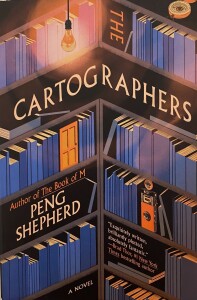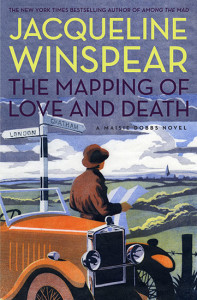
What a find! I love maps. I mean, I really love maps. Especially paper ones, the kind you have to fold just right. When I was young, they were both a vehicle for dreams of adventure and a way to comprehend the space around me. Once I understood the grid of Baltimore and the spider rotaries of Worcester, the storied streets of London and the plazas of Madrid, I could venture out with confidence.
I also love mysteries, so I was delighted to come across this novel in my local indie bookstore. My expectations soared so high that I should be reporting disappointment now. In fact, they were not high enough. I loved the maps, the tangled mystery, and the true story that seeded the novel.
Nell Young loves maps and once dreamed of working with her brilliant father in the Map Room of the New York Public Library. Her even more brilliant cartographer mother died when Nell was a toddler. But Nell’s dream had exploded seven years ago in a disastrous argument with her father that destroyed the careers of both Nell and her then-boyfriend Felix. Now Nell works for a hole-in-the-wall operation that gussies up semi-historical maps with sea monsters and fake age spots.
Then she gets an emergency call from the New York Public Library.
Nell embarks on a quest to identify the monster behind a string of thefts and murder. In order to accomplish that, she must finally lay bare the secrets of the common highway map that caused the argument with her father and explore the mystery of her parents’ past. She forces herself to get in touch with Felix for the first time since that terrible argument; he is now working on a cutting-edge mega-map and might have technology that can help her.
Lately I’ve been thinking about goal shift—when I was an engineer we called it requirements creep—and how that can be a good thing in a story (though it isn’t in an engineering project). Writers know that what drives most stories is the protagonist’s push to achieve a goal, whether it’s destroying a ring of power or marrying your true love. However, often in a story, as that main character moves through adventure after adventure, their goal may change or may accrue related goals. For example, Frodo’s original goal was simply to hand over the ring to the Elves, not to go all the way to Mordor. Elizabeth Bennet’s original goal was to get her sister married to Mr. Bingley and to ignore the snobby Mr. Darcy.
Here, Nell’s journey grows tendril after tendril of secrets that must be unraveled, making for a delightfully complicated plot filled with surprises and satisfying shifts.
I often dislike novels with multiple points of view—different characters taking over telling the story—but here I found it worked well. For one thing, the change of voices is smoothly handled, usually by a new chapter. For another, each person in the team that coalesces around Nell has a piece of the story to tell, so having them tell it in their own voice is a clear and economical solution. We are never in doubt that Nell is the main character, no matter how much we may come to care about some of the others.
If you like a good mystery or maps or—even better—both, check out this book!
Have you read a novel about a map that you can recommend?
